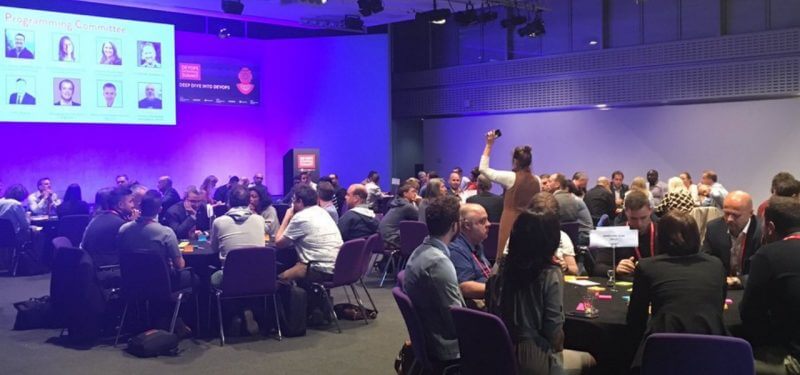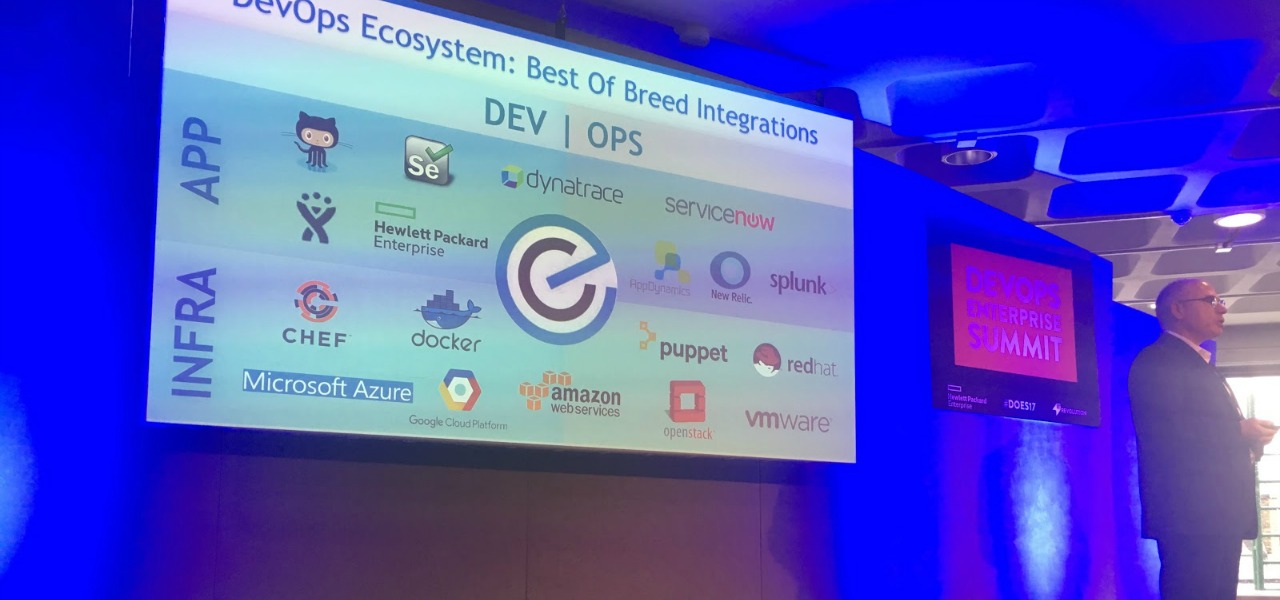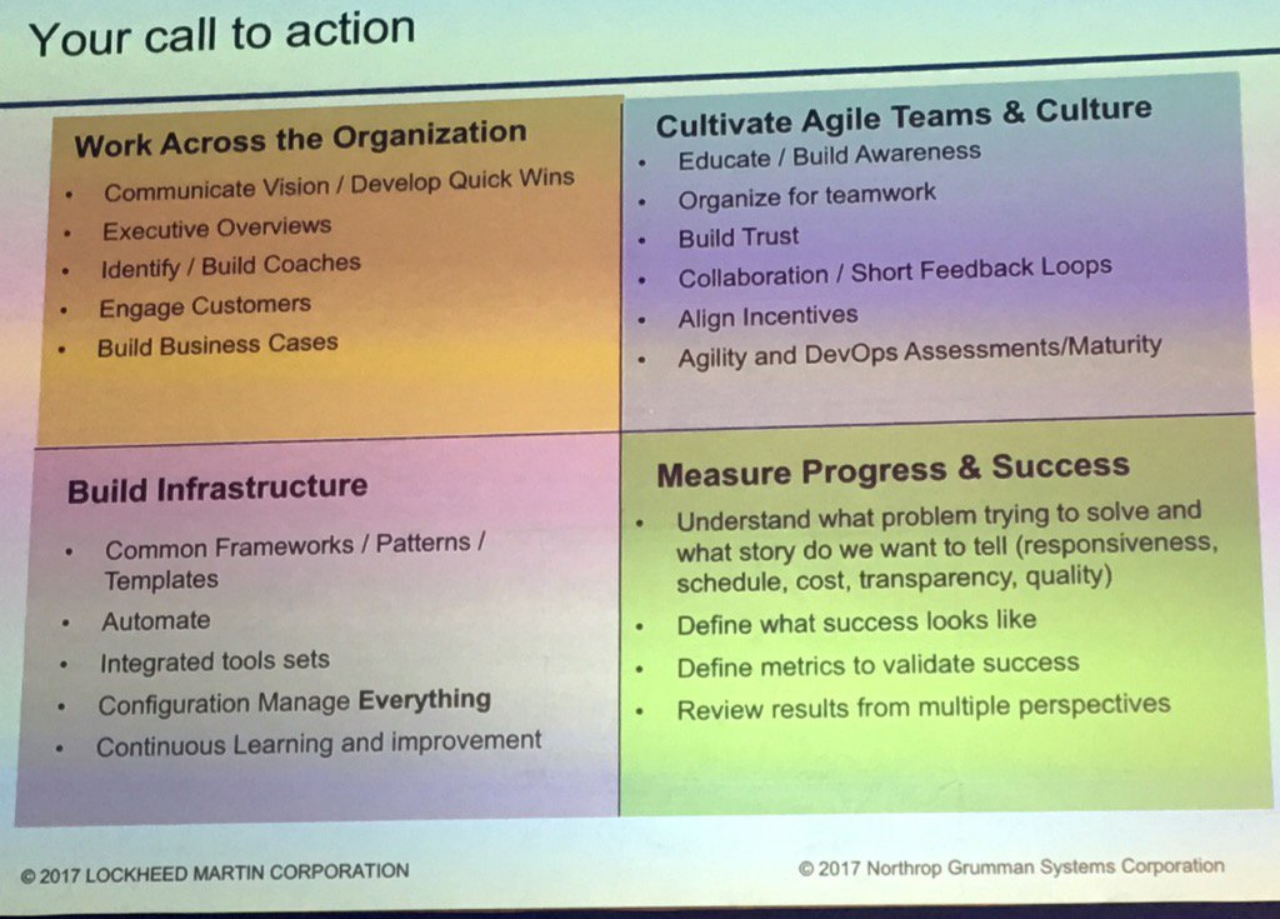After spending two amazing days with 700 of my closest DevOps cohorts from Europe, the Middle East, Africa, and beyond, I learned all about the latest and greatest IT and technology transformation reports at the DevOps Enterprise Summit London. With substantial growth in attendance from the first year, in 2016, the buzz around the show was palpable. And, what a location! From the venue, the QEII Centre, we had 360-degree views of central London, from Big Ben to the London Eye and beyond.
Despite the terrorist attack that had happened less than 48 hours before the start of the event, the community had the courage and determination to “keep calm and carry on” and to not let that affect the days of learning and sharing ahead.
Electric Cloud CEO Steve Brodie shared insights on the DevOps ecosystem at DevOps Enterprise Summit London.
Speaking of courage and community, those were two central themes we heard consistently in nearly every presentation at the event. Another major theme was the need for IT leadership to finally get a seat at the business decision makers' table. Read on as I dive into the key learnings from DevOps Enterprise Summit London.
All you need is courage
Throughout the two-day conference, I attended many sessions and had many insightful conversations with fellow attendees. One major theme centered on the idea of courage—the courage to leverage new technologies, the courage to ask "Why?" and the courage to provide honest feedback.
[ View Steve Brodie's keynote presentation with Gene Kim at DevOps Enterprise Summit London below ]
“Honest feedback takes tremendous courage, but it's key to optimal success," said presenter Dominica DeGrandis, executive consultant at LeanKit, who was speaking about how to unmask work in progress (WIP). I could not agree more.
[ SEE: Make your team's work visible: How to unmask capacity-killing WIP ]
What stuck out most to me with regard to courage was the idea of trying something completely new, even when there is a strong possibility of failure. Alexa Alley, program manager at Hearst Business Media, addressed this most directly, since her presentation on value stream mapping landed on the notion that “failure is fine because at least you tried and learned”—a theme I heard many times over.
[ SEE: How value stream mapping delivered on DevOps' promise for Hearst Business Media ]
It was extremely gratifying to hear technology leaders from highly regulated industries and government institutions echo the call for boldness and courage as well. Mayank Prakash, director general and chief digital and information officer at the UK Department for Work and Pensions, said something I want to echo to future generations: “If I could have told myself something 10 years ago, I would say, ‘Be bold in your ambitions.’ It is useless to create goals that you know you can achieve easily. Shoot for the stars.”
This mindset is one of the most difficult to achieve, but if you believe in something strongly, commit yourself fully to the process of making it happen, regardless of how much blowback you might get along the way. Mark Schwartz, CIO of US Citizenship and Immigration Services and a noted author, came straight out with it and said, “IT leadership is all about courage. You must overcome the power and control issues with the business, which requires changing the most basic assumptions about IT in general. This takes courage.”
There were numerous highlights about risk taking and courage across the spectrum of organizations represented. These are just some of the many challenges organizations and individuals face. A DevOps mindset is the shot in the arm needed to face this head on.
Community continues to be critical
Beyond the underlying need for courage, DevOps Enterprise Summit London attendees and speakers continually reminded me that you cannot venture into the unknown alone. Any organization's DevOps transformation journey is a reflection of its own community. We all fail, learn, grow, and teach together.
As IT Revolution's Gene Kim said on day one, the DevOps Enterprise Summit is "mutually exothermic,” meaning that “we are a community that strives to help one another.” This value was evident in the numerous presentations as well. Jason Cox, director of systems engineering at Walt Disney, said, “Building a strong community across the organization is key.” This, as he says, is one of the key factors that helps the company bring “the magic” into IT.
Suzette Johnson, a technical fellow at Northrup Grumman Systems, and Robin Yeman, a technical fellow at Lockheed Martin, joined up for a dual presentation about life and community in the US Department of Defense realm. What a wonderful scene to behold as two female technologists and IT leaders (from competing companies in the marketplace, no less!) talked about the need for community and collaboration when tackling problems in a highly risk-averse environment.
For them, it is all about developing an agile community of practice for others to participate. Here are the calls to action for their organizations:
The DevOps calls to action at Lockheed Martin Corp. and Northrup Grumman Systems Corp.
A big part of making any community successful is culture. John Willis, a leader in container systems and co-author of The DevOps Handbook, said of the CAMS (culture, automation, measurement, and sharing) model, “If the culture isn’t there, the rest of it doesn’t matter.”
Culture is reflected in many things—from sharing the overall company vision with everyone in the organization to encouraging buy-in and collaboration. Chris Hill, software development manager at Jaguar Land Rover, spoke about how his company encourages the developer community culture. In order to “decrease developer ramp-up time, you need to establish a community with transparency,” he said. With transparency comes honesty and integrity, two important elements that lead to trust, which is core not only to building a true community, but also to growing it.
IT leadership needs a seat at the table
The last major theme from DevOps Enterprise Summit London was that business leadership should bring IT practitioners and leaders to the executive roundtable. The reality is that silos do exist within business and IT, which is why the latter needs a way to influence and guide business decision making.
We often hear business leaders making product feature requirements and time-to-market deadlines without consulting the IT side of the shop. As an executive myself, it is sometimes a quick jump to make demands (based on external pressures from investors, the board, customers, etc.) without fully understanding what it takes to deliver something of value to the market.
We live in an on-demand economy, and business leaders want to stay ahead of the competition and get to market faster, but without incurring too much risk. Andrea Hirzle-Yager, head of the IT department at Allianz Deutchland AG, spoke about the unreasonable expectations she and her team faced and what they are doing to overcome those challenges. It was a wonderful talk; I highly recommend watching it.
Schwartz, who also spoke at length on the same topic, just released the book A Seat at the Table, regarding business value delivery and bridging the business and IT gap. One of his top quotes was, "Beware of simply scaling down command and control with digital transformation. Dev teams should be testing hypotheses.” What a concept! The need for hypothesis-driven development, and treating IT as part of the business, will continue to evolve as we move forward, Schwartz said.
Jonathan Fletcher, chief technology officer at Hiscox, gave an honest and open talk about these same challenges. “If we don't transform, then the competition will march on us!” he said. But, he added, DevOps and cloud transformation “doesn't mean losing people. It means changing how they bring value to the company.” I loved his idea of converting IT service tickets into user stories to help bridge the DevOps gap. Often, the right attitude is greater than having the best of tech skills.
[ SEE: 5 lessons: How DevOps, cloud reinvented IT Ops at Hiscox ]
All of this requires immense courage, a strong community, and an integral voice not only from those leading from the top of an organization, but also from those leading the technology and process changes internally.
Time to catch up with DevOps
Organizations across the pond aren't “catching up” to the DevOps adoption in the US; they are just tackling problems in different ways. It's clear that DevOps and agile adoption is increasing across all sectors, as it is in the US, and DevOps practices are seeping further into those organizations. But when you think about the age of some of these companies, such as Barclay’s, which was established in 1690—twice the age of even the oldest US companies—it makes you reconsider what a legacy system really is, and what it means.
[ SEE: How Barclays balances speed vs. control in DevOps ]
In the US, a legacy system or process is potentially as young as 10 years old. In Europe, it can be hundreds of years old. DevOps might have ramped up in the US much earlier, especially in Silicon Valley, but those organizations aren’t dealing with the same problems as companies founded centuries ago. And, after the second year at DevOps Enterprise Summit London , the methodology is clearly being solidified in and across Europe. If organizations such as Barclays, the UK Department for Work and Pensions, and Allianz can embark upon and show success along a DevOps journey, any company in the world can do the same.
The stories shared at DevOps Enterprise Summit London were not just inspiring but also illustrated the progress and strength DevOps is gaining across the world. Courage, community, and the alignment of culture, collaboration, and tools are the key ingredients in a successful DevOps journey. I'm looking forward to hearing more at DevOps Enterprise Summit San Francisco this fall.
Want to know more about what the above speakers had to say at DevOps Enterprise Summit London? Watch their complete presentations on the IT Revolution YouTube channel.
Image, top: The DevOps workshop at DevOps Enterprise Summit London this week.
Keep learning
Take a deep dive into the state of quality with TechBeacon's Guide. Plus: Download the free World Quality Report 2022-23.
Put performance engineering into practice with these top 10 performance engineering techniques that work.
Find to tools you need with TechBeacon's Buyer's Guide for Selecting Software Test Automation Tools.
Discover best practices for reducing software defects with TechBeacon's Guide.
- Take your testing career to the next level. TechBeacon's Careers Topic Center provides expert advice to prepare you for your next move.





